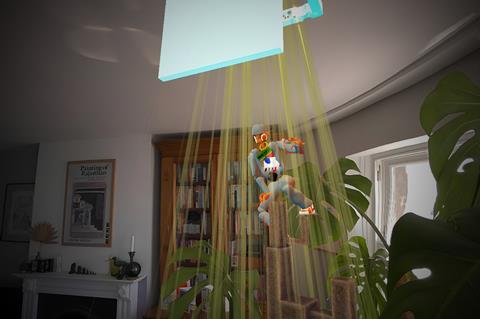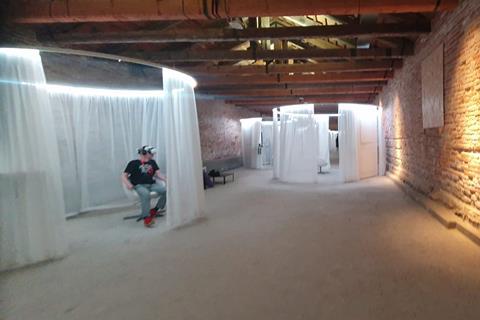
Alongside her lead role in Pedro Almodovar’s Competition title The Room Next Door, Tilda Swinton features in another Venice Official Selection title – as narrator of immersive title Impulse: Playing With Reality.
Impulse has had its world premiere in Venice Immersive, one of 26 projects in the Competition section. A further 30 projects played out of competition, and there were seven projects in the Biennale College Cinema’s Immersive strand.
Directed by May Abdalla and Barry Gene Murphy and produced by UK company Anagram alongside France and Canada-based Floréal, Impulse uses a mixed reality format – a blend of digital and physical worlds – to give viewers a sense of what it feels like to live with ADHD.
Mia Bays, director of the UK’s BFI Film Fund, chose it as her favourite of the extended reality works in Venice this year. (Extended reality is the umbrella term for VR, MR and AR).
“Anagram’s work centres real-life experience in innovative and truly immersive ways. This is no exception,” says Bays, who visited the immersive site during the festival. “Their ongoing collaboration with Tilda Swinton evidences how strong their work is and far they are travelling into future forms.”
Last month the project was acquired by Meta, the company that owns Facebook, Instagram and WhatsApp. It will premiere exclusively on the Meta Quest platform later this month, priced at $4.99; before playing in the immersive section at BFI London Film Festival.
Katayoun Dibamehr, co-producer on the work through France- and Canada-based Floréal, confirms the creators have each received a cut of each Meta sale, in a model similar to that used by many feature films.
She believes interest in extended reality works at film festivals is growing. “We see more and more press and PRs who are interested,” revealsDibamehr, who has been coming to Venice Immersive for six years, and was co-producer on Goliath, winner of the 2021 best VR immersive work at Venice and was also narrated by Swinton. “When we get credit from festivals with a history of film behind them like Venice, it is officialising that there are other formats.”
Goliath was the first part of a three-part series in which Impulse is the second instalment.
Island industry
The Venice Immersive strand was established in 2017 by the UK’s Liz Rosenthal and France’s Michel Reilhac, making Venice the first major festival to have an immersive programme as part of the official selection. After a trial run in 2016, they set up shop on Lazzaretto Vecchio – a small island just 30 yards from the Lido, site of the main festival. The entire island is occupied by the Immersive building, which has its own history as a hospital for treating plague victims on several occasions throughout Venice’s history.
In a marked change from the queuing and crammed screening rooms of the main festival, the Immersive building has a serene atmosphere. Many of the works are exhibited in circular chambers created by loose white curtains, looking like giant jellyfish. Each exhibit is supervised by festival staff, trained in its individual usage and headsets are sanitised between each user.

“It’s a delight to have so many powerful works clustered in one calm zen-like space beyond the heat and crowds of Venice, and it’s where you can meet so many people at the cutting edge of the form, from makers to venues to funders,” says Bays.
“It was always the intention that we would be setting up a space and a showcase to show that this wasn’t research and development, it wasn’t just a tech demo,” says Rosenthal. “This is a true art form that should be supported and showcased. The idea was to create a new type of exhibition culture.”
Myriam Achard, head of new media partnerships & PR at Canadian arts foundation PHI Centre, says Venice Immersive is the leading hub for the extended reality sector. “Almost the entire industry gathers there,” says Achard. “The curation is very strong, different technologies are presented. There is a good balance between established and emerging creators.”
Disney+ premiered its first-ever interactive original work at this year’s event – an out-of -competition Marvel piece titled What If…? An Immersive Story, played through the Apple Vision Pro headset. Other programme highlights include Museum Alive Immersive With David Attenborough. Several projects addressed current events, including Fragile Home, which transforms the player’s immediate surroundings into the dwelling of a Ukrainian family during the war with Russia.
The building also plays host to a Venice Production Bridge market, akin to the feature film equivalent on the Lido. Dibamehr presented two extended reality projects there – The Cure For Straightness and Dysmorphia – with executives attending from companies including Apple. “Producers who work across cinema and immersive know spatial mediums are going to be very important in all our entertainment forms,” says Rosenthal, citing the Peaky Blinders work that premiered in 2022 before launching last year. “It’s interesting seeing the development of an ecosystem.”
Bays believes the Venice Immersive offering should be “on the wider industry’s radar, as this is where we can see a lot of internationally renowned artists making work that stretches the form and boundaries thereof.
“I’m still surprised how many film people have never visited,” says Bays. “We need to merge more.”























No comments yet